- Home
- Roald Dahl
Charlie and the Chocolate Factory (Puffin Modern Classics relaunch)
Charlie and the Chocolate Factory (Puffin Modern Classics relaunch) Read online
For Theo
Some reviews of
Charlie and the Chocolate Factory
‘One of the most popular children’s books of all times’
– Sunday Times
‘Roald Dahl and Quentin Blake have made an important and lasting contribution to children’s literature’ – Guardian
‘A book that requires no introduction as it is probably Dahl’s best-known and most-read creation and deservedly so… Brilliant’
– Lovereading4Kids
Winner of the Millennium Children’s Book Award (UK, 2000) and nominated as one of the nation’s favourite books in the BBC’s Big Read campaign, 2003
Books by Roald Dahl
The BFG
Boy: Tales of Childhood
Charlie and the Chocolate Factory
Charlie and the Great Glass Elevator
Danny the Champion of the World
George’s Marvellous Medicine
Going Solo
James and the Giant Peach
The Witches
Matilda
For younger readers
The Enormous Crocodile
Esio Trot
Fantastic Mr Fox
The Giraffe and the Pelly and Me
The Magic Finger
The Twits
Picture books
Dirty Beasts (with Quentin Blake)
The Enormous Crocodile (with Quentin Blake)
The Minpins (with Patrick Benson)
Revolting Rhymes (with Quentin Blake)
Teenage fiction
The Great Automatic Grammatizator and Other Stories
Rhyme Stew
Skin and Other Stories
The Vicar of Nibbleswicke
The Wonderful Story of Henry Sugar and Six More
PUFFIN MODERN CLASSICS
Roald Dahl was born in 1916 in Wales of Norwegian parents. He was educated in England and went on to work for the Shell Oil Company in Africa. He began writing after a ‘monumental bash on the head’ sustained as an RAF fighter pilot during the Second World War. Roald Dahl is one of the most successful and well known of all children’s writers. His books, which are read by children the world over, include The BFG and The Witches, winner of the 1983 Whitbread Award. Roald Dahl died in 1990 at the age of seventy-four.
Quentin Blake is one of Britain’s most successful illustrators. His first drawings were published in Punch magazine when he was sixteen and still at school. Quentin Blake has illustrated over three hundred books and he was Roald Dahl’s favourite illustrator. He has won many awards and prizes, including the Whitbread Award and the Kate Greenaway Medal. In 1999 he was chosen to be the first ever Children’s Laureate and in 2005 he was awarded a CBE for services to children’s literature.
ROALD DAHL
Illustrated by
Quentin Blake
PUFFIN
PUFFIN BOOKS
Published by the Penguin Group
Penguin Books Ltd, 80 Strand, London WC2R 0RL, England
Penguin Group (USA) Inc., 375 Hudson Street, New York, New York 10014, USA
Penguin Group (Canada), 90 Eglinton Avenue East, Suite 700, Toronto, Ontario, Canada M4P 2Y3 (a division of Pearson Penguin Canada Inc.)
Penguin Ireland, 25 St Stephen’s Green, Dublin 2, Ireland (a division of Penguin Books Ltd)
Penguin Group (Australia), 250 Camberwell Road, Camberwell, Victoria 3124, Australia (a division of Pearson Australia Group Pty Ltd)
Penguin Books India Pvt Ltd, 11 Community Centre, Panchsheel Park, New Delhi – 110 017, India
Penguin Group (NZ), 67 Apollo Drive, Rosedale, North Shore 0632, New Zealand (a division of Pearson New Zealand Ltd)
Penguin Books (South Africa) (Pty) Ltd, 24 Sturdee Avenue, Rosebank, Johannesburg 2196, South Africa
Penguin Books Ltd, Registered Offices: 80 Strand, London WC2R 0RL, England
puffinbooks.com
First published in the USA 1964
Published in Great Britain by George Allen & Unwin 1967
Published in Puffin Books 1973
Reissued with new illustrations 1995
Published in Puffin Modern Classics 1997, 2004
This edition reissued 2010
Text copyright © Roald Dahl Nominee Ltd, 1964
Illustrations copyright © Quentin Blake, 1995
Introduction copyright © Julia Eccleshare, 2004
All rights reserved
The moral right of the author and illustrator has been asserted
Except in the United States of America, this book is sold subject to the condition that it shall not, by way of trade or otherwise, be lent, re-sold, hired out, or otherwise circulated without the publisher’s prior consent in any form of binding or cover other than that in which it is published and without a similar condition including this condition being imposed on the subsequent purchaser
A CIP catalogue record for this book is available from the British Library
ISBN: 978-0-141-96061-6
Contents
1 Here Comes Charlie
2 Mr Willy Wonka’s Factory
3 Mr Wonka and the Indian Prince
4 The Secret Workers
5 The Golden Tickets
6 The First Two Finders
7 Charlie’s Birthday
8 Two More Golden Tickets Found
9 Grandpa Joe Takes a Gamble
10 The Family Begins to Starve
11 The Miracle
12 What It Said on the Golden Ticket
13 The Big Day Arrives
14 Mr Willy Wonka
15 The Chocolate Room
16 The Oompa-Loompas
17 Augustus Gloop Goes up the Pipe
18 Down the Chocolate River
19 The Inventing Room – Everlasting Gobstoppers and Hair Toffee
20 The Great Gum Machine
21 Good-bye Violet
22 Along the Corridor
23 Square Sweets That Look Round
24 Veruca in the Nut Room
25 The Great Glass Lift
26 The Television-Chocolate Room
27 Mike Teavee is Sent by Television
28 Only Charlie Left
29 The Other Children Go Home
30 Charlie’s Chocolate Factory
There are five children in this book:
AUGUSTUS GLOOP
A greedy boy
VERUCA SALT
A girl who is spoiled by her parents
VIOLET BEAUREGARDE
A girl who chews gum all day long
MIKE TEAVEE
A boy who does nothing but watch television and
CHARLIE BUCKET
The hero
1 Here Comes Charlie
These two very old people are the father and mother of Mr Bucket. Their names are Grandpa Joe and Grandma Josephine.
And these two very old people are the father and mother of Mrs Bucket. Their names are Grandpa George and Grandma Georgina.
This is Mr Bucket. This is Mrs Bucket.
Mr and Mrs Bucket have a small boy whose name is Charlie Bucket.
This is Charlie.
How d’you do? And how d’you do? And how d’you do again? He is pleased to meet you.
The whole of this family – the six grown-ups (count them) and little Charlie Bucket – live together in a small wooden house on the edge of a great town.
The house wasn’t nearly large enough for so many people, and life was extremely uncomfortable for them all. There were only two rooms in the place altogether, and there was only one bed. The bed was given to the four old gr
andparents because they were so old and tired. They were so tired, they never got out of it.
Grandpa Joe and Grandma Josephine on this side, Grandpa George and Grandma Georgina on this side.
Mr and Mrs Bucket and little Charlie Bucket slept in the other room, upon mattresses on the floor.
In the summertime, this wasn’t too bad, but in the winter, freezing cold draughts blew across the floor all night long, and it was awful.
There wasn’t any question of them being able to buy a better house – or even one more bed to sleep in. They were far too poor for that.
Mr Bucket was the only person in the family with a job. He worked in a toothpaste factory, where he sat all day long at a bench and screwed the little caps on to the tops of the tubes of toothpaste after the tubes had been filled. But a toothpaste cap-screwer is never paid very much money, and poor Mr Bucket, however hard he worked, and however fast he screwed on the caps, was never able to make enough to buy one half of the things that so large a family needed. There wasn’t even enough money to buy proper food for them all. The only meals they could afford were bread and margarine for breakfast, boiled potatoes and cabbage for lunch, and cabbage soup for supper. Sundays were a bit better. They all looked forward to Sundays because then, although they had exactly the same, everyone was allowed a second helping.
The Buckets, of course, didn’t starve, but every one of them – the two old grandfathers, the two old grandmothers, Charlie’s father, Charlie’s mother, and especially little Charlie himself – went about from morning till night with a horrible empty feeling in their tummies.
Charlie felt it worst of all. And although his father and mother often went without their own share of lunch or supper so that they could give it to him, it still wasn’t nearly enough for a growing boy. He desperately wanted something more filling and satisfying than cabbage and cabbage soup. The one thing he longed for more than anything else was… CHOCOLATE.
Walking to school in the mornings, Charlie could see great slabs of chocolate piled up high in the shop windows, and he would stop and stare and press his nose against the glass, his mouth watering like mad. Many times a day, he would see other children taking bars of creamy chocolate out of their pockets and munching them greedily, and that, of course, was pure torture.
Only once a year, on his birthday, did Charlie Bucket ever get to taste a bit of chocolate. The whole family saved up their money for that special occasion, and when the great day arrived, Charlie was always presented with one small chocolate bar to eat all by himself. And each time he received it, on those marvellous birthday mornings, he would place it carefully in a small wooden box that he owned, and treasure it as though it were a bar of solid gold; and for the next few days, he would allow himself only to look at it, but never to touch it. Then at last, when he could stand it no longer, he would peel back a tiny bit of the paper wrapping at one corner to expose a tiny bit of chocolate, and then he would take a tiny nibble – just enough to allow the lovely sweet taste to spread out slowly over his tongue. The next day, he would take another tiny nibble, and so on, and so on. And in this way, Charlie would make his sixpenny bar of birthday chocolate last him for more than a month.
But I haven’t yet told you about the one awful thing that tortured little Charlie, the lover of chocolate, more than anything else. This thing, for him, was far, far worse than seeing slabs of chocolate in the shop windows or watching other children munching bars of creamy chocolate right in front of him. It was the most terrible torturing thing you could imagine, and it was this:
In the town itself, actually within sight of the house in which Charlie lived, there was an ENORMOUS CHOCOLATE FACTORY!
Just imagine that!
And it wasn’t simply an ordinary enormous chocolate factory, either. It was the largest and most famous in the whole world! It was WONKA’S FACTORY, owned by a man called Mr Willy Wonka, the greatest inventor and maker of chocolates that there has ever been. And what a tremendous, marvellous place it was! It had huge iron gates leading into it, and a high wall surrounding it, and smoke belching from its chimneys, and strange whizzing sounds coming from deep inside it. And outside the walls, for half a mile around in every direction, the air was scented with the heavy rich smell of melting chocolate!
Twice a day, on his way to and from school, little Charlie Bucket had to walk right past the gates of the factory. And every time he went by, he would begin to walk very, very slowly, and he would hold his nose high in the air and take long deep sniffs of the gorgeous chocolatey smell all around him.
Oh, how he loved that smell!
And oh, how he wished he could go inside the factory and see what it was like!
2
Mr Willy Wonka’s Factory
In the evenings, after he had finished his supper of watery cabbage soup, Charlie always went into the room of his four grandparents to listen to their stories, and then afterwards to say good night.
Every one of these old people was over ninety. They were as shrivelled as prunes, and as bony as skeletons, and throughout the day, until Charlie made his appearance, they lay huddled in their one bed, two at either end, with nightcaps on to keep their heads warm, dozing the time away with nothing to do. But as soon as they heard the door opening, and heard Charlie’s voice saying, ‘Good evening, Grandpa Joe and Grandma Josephine, and Grandpa George and Grandma Georgina,’ then all four of them would suddenly sit up, and their old wrinkled faces would light up with smiles of pleasure – and the talking would begin. For they loved this little boy. He was the only bright thing in their lives, and his evening visits were something that they looked forward to all day long. Often, Charlie’s mother and father would come in as well, and stand by the door, listening to the stories that the old people told; and thus, for perhaps half an hour every night, this room would become a happy place, and the whole family would forget that it was hungry and poor.
One evening, when Charlie went in to see his grandparents, he said to them, ‘Is it really true that Wonka’s Chocolate Factory is the biggest in the world?’
‘True?’ cried all four of them at once. ‘Of course it’s true! Good heavens, didn’t you know that? It’s about fifty times as big as any other!’
‘And is Mr Willy Wonka really the cleverest chocolate maker in the world?’
‘My dear boy,’ said Grandpa Joe, raising himself up a little higher on his pillow, ‘Mr Willy Wonka is the most amazing, the most fantastic, the most extraordinary chocolate maker the world has ever seen! I thought everybody knew that!’
‘I knew he was famous, Grandpa Joe, and I knew he was very clever…’
‘Clever!’ cried the old man. ‘He’s more than that! He’s a magician with chocolate! He can make anything – anything he wants! Isn’t that a fact, my dears?’
The other three old people nodded their heads slowly up and down, and said, ‘Absolutely true. Just as true as can be.’
And Grandpa Joe said, ‘You mean to say I’ve never told you about Mr Willy Wonka and his factory?’
‘Never,’ answered little Charlie.
‘Good heavens above! I don’t know what’s the matter with me!’
‘Will you tell me now, Grandpa Joe, please?’
‘I certainly will. Sit down beside me on the bed, my dear, and listen carefully.’
Grandpa Joe was the oldest of the four grandparents. He was ninety-six and a half, and that is just about as old as anybody can be. Like all extremely old people, he was delicate and weak, and throughout the day he spoke very little. But in the evenings, when Charlie, his beloved grandson, was in the room, he seemed in some marvellous way to grow quite young again. All his tiredness fell away from him, and he became as eager and excited as a young boy.
‘Oh, what a man he is, this Mr Willy Wonka!’ cried Grandpa Joe. ‘Did you know, for example, that he has himself invented more than two hundred new kinds of chocolate bars, each with a different centre, each far sweeter and creamier and more delicious than anything the ot
her chocolate factories can make!’
‘Perfectly true!’ cried Grandma Josephine. ‘And he sends them to all the four corners of the earth! Isn’t that so, Grandpa Joe?’
‘It is, my dear, it is. And to all the kings and presidents of the world as well. But it isn’t only chocolate bars that he makes. Oh, dear me, no! He has some really fantastic inventions up his sleeve, Mr Willy Wonka has! Did you know that he’s invented a way of making chocolate ice cream so that it stays cold for hours and hours without being in the refrigerator? You can even leave it lying in the sun all morning on a hot day and it won’t go runny!’
‘But that’s impossible!’ said little Charlie, staring at his grandfather.
‘Of course it’s impossible!’ cried Grandpa Joe. ‘It’s completely absurd! But Mr Willy Wonka has done it!’
‘Quite right!’ the others agreed, nodding their heads. ‘Mr Wonka has done it.’
‘And then again,’ Grandpa Joe went on speaking very slowly now so that Charlie wouldn’t miss a word, ‘Mr Willy Wonka can make marshmallows that taste of violets, and rich caramels that change colour every ten seconds as you suck them, and little feathery sweets that melt away deliriously the moment you put them between your lips. He can make chewing-gum that never loses its taste, and sugar balloons that you can blow up to enormous sizes before you pop them with a pin and gobble them up. And, by a most secret method, he can make lovely blue birds’ eggs with black spots on them, and when you put one of these in your mouth, it gradually gets smaller and smaller until suddenly there is nothing left except a tiny little pink sugary baby bird sitting on the tip of your tongue.’
Grandpa Joe paused and ran the point of his tongue slowly over his lips. ‘It makes my mouth water just thinking about it,’ he said.
‘Mine, too,’ said little Charlie. ‘But please go on.’

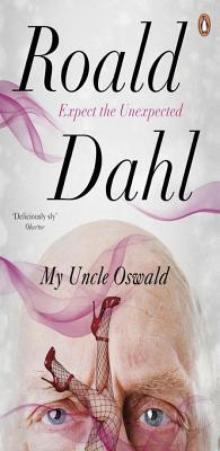 My Uncle Oswald
My Uncle Oswald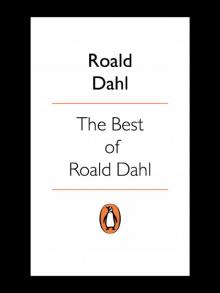 The Best of Roald Dahl
The Best of Roald Dahl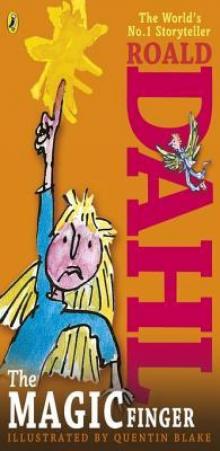 The Magic Finger
The Magic Finger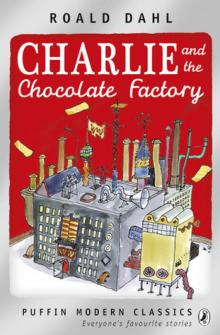 Charlie and the Chocolate Factory
Charlie and the Chocolate Factory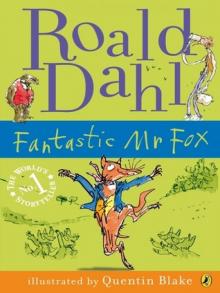 Fantastic Mr Fox
Fantastic Mr Fox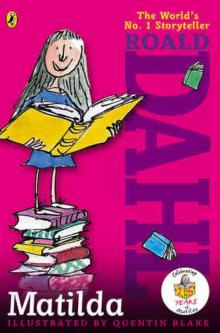 Matilda
Matilda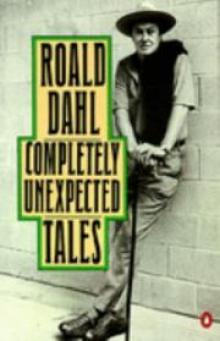 Completely Unexpected Tales: Tales of the Unexpected. More Tales of the Unexpected
Completely Unexpected Tales: Tales of the Unexpected. More Tales of the Unexpected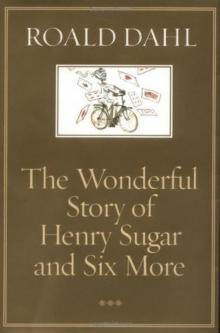 The Wonderful Story of Henry Sugar and Six More
The Wonderful Story of Henry Sugar and Six More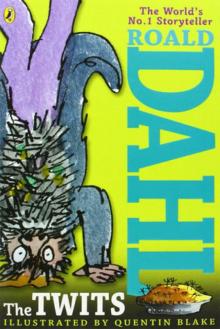 The Twits
The Twits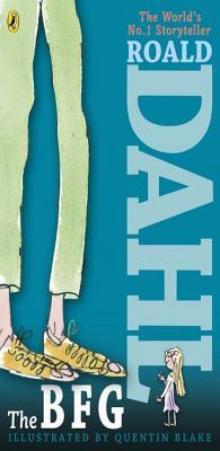 The BFG
The BFG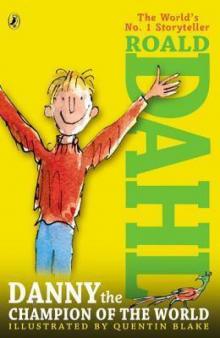 Danny the Champion of the World
Danny the Champion of the World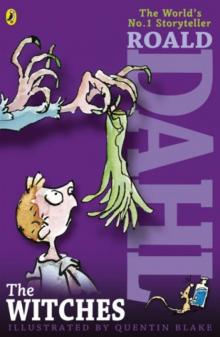 The Witches
The Witches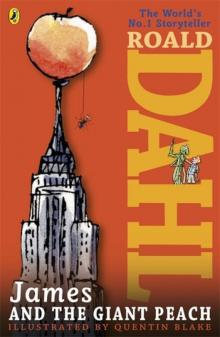 James and the Giant Peach
James and the Giant Peach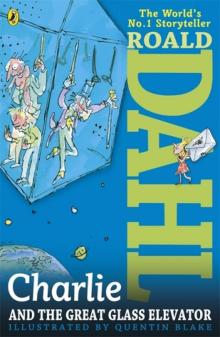 Charlie and the Great Glass Elevator
Charlie and the Great Glass Elevator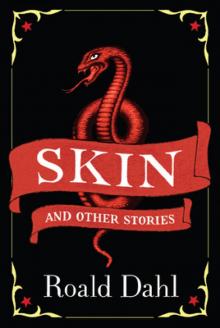 Skin and Other Stories
Skin and Other Stories Kiss Kiss
Kiss Kiss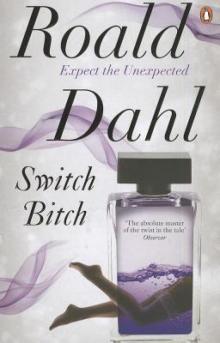 Switch Bitch
Switch Bitch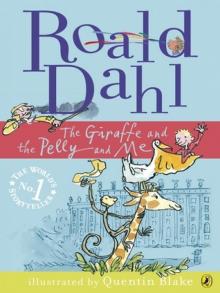 The Giraffe and the Pelly and Me
The Giraffe and the Pelly and Me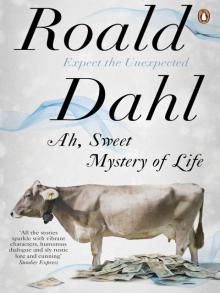 Ah, Sweet Mystery of Life
Ah, Sweet Mystery of Life Fear
Fear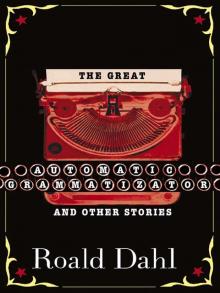 The Great Automatic Grammatizator and Other Stories
The Great Automatic Grammatizator and Other Stories Someone Like You
Someone Like You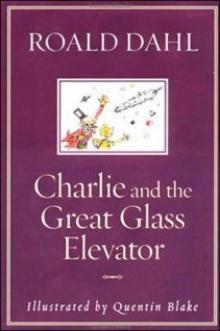 Charlie and the Great Glass Elevator c-2
Charlie and the Great Glass Elevator c-2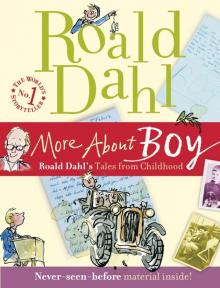 More About Boy
More About Boy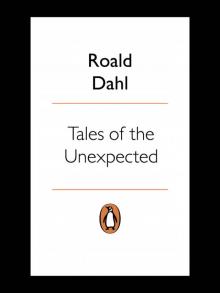 Tales of the Unexpected
Tales of the Unexpected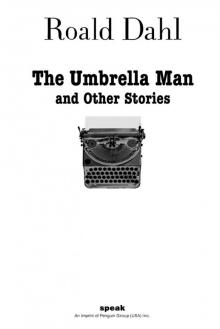 The Umbrella Man and Other Stories
The Umbrella Man and Other Stories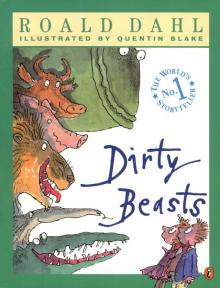 Dirty Beasts
Dirty Beasts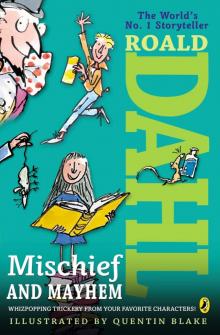 Roald Dahl's Mischief and Mayhem
Roald Dahl's Mischief and Mayhem The Collected Short Stories of Roald Dahl, Volume 1
The Collected Short Stories of Roald Dahl, Volume 1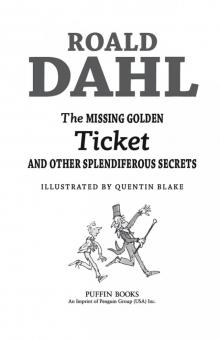 The Missing Golden Ticket and Other Splendiferous Secrets
The Missing Golden Ticket and Other Splendiferous Secrets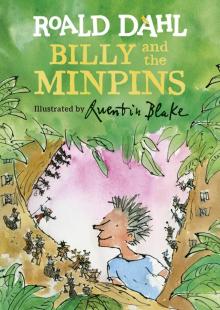 Billy and the Minpins
Billy and the Minpins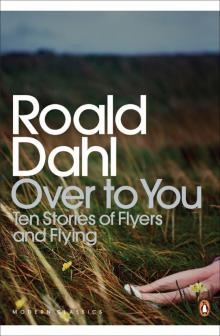 Over to You
Over to You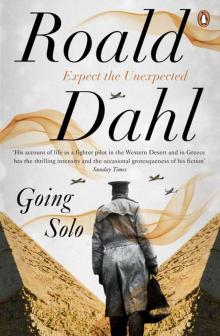 Going Solo
Going Solo Deception
Deception War
War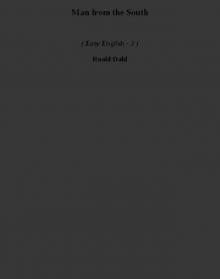 Man from the South ee-3
Man from the South ee-3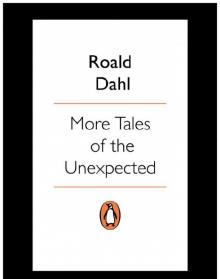 More Tales of the Unexpected
More Tales of the Unexpected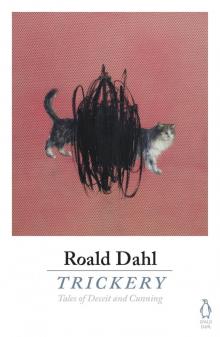 Trickery
Trickery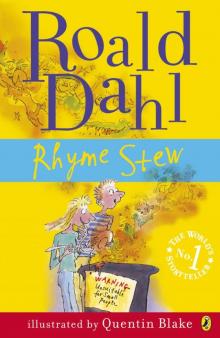 Rhyme Stew
Rhyme Stew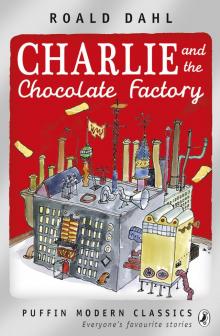 Charlie and the Chocolate Factory (Puffin Modern Classics relaunch)
Charlie and the Chocolate Factory (Puffin Modern Classics relaunch)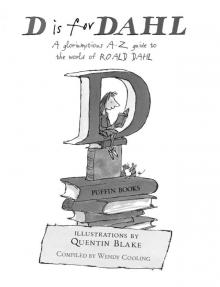 D is for Dahl
D is for Dahl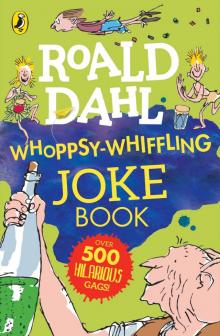 Roald Dahl Whoppsy-Whiffling Joke Book
Roald Dahl Whoppsy-Whiffling Joke Book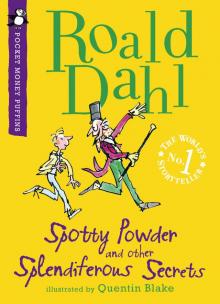 Spotty Powder and other Splendiferous Secrets
Spotty Powder and other Splendiferous Secrets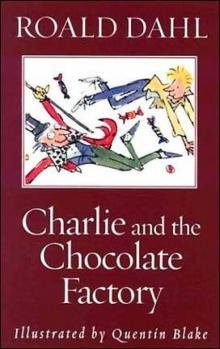 Charlie and the Chocolate Factory c-1
Charlie and the Chocolate Factory c-1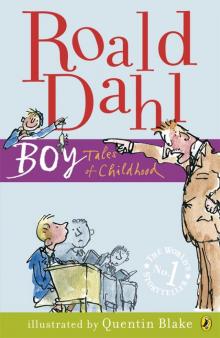 Boy
Boy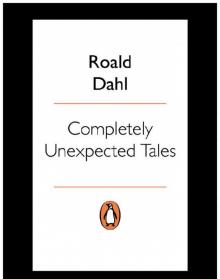 Completely Unexpected Tales
Completely Unexpected Tales Madness
Madness Innocence
Innocence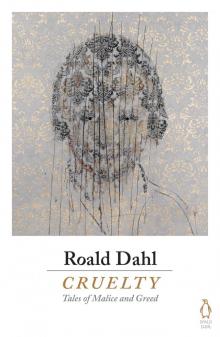 Cruelty
Cruelty George's Marvellous Medicine
George's Marvellous Medicine